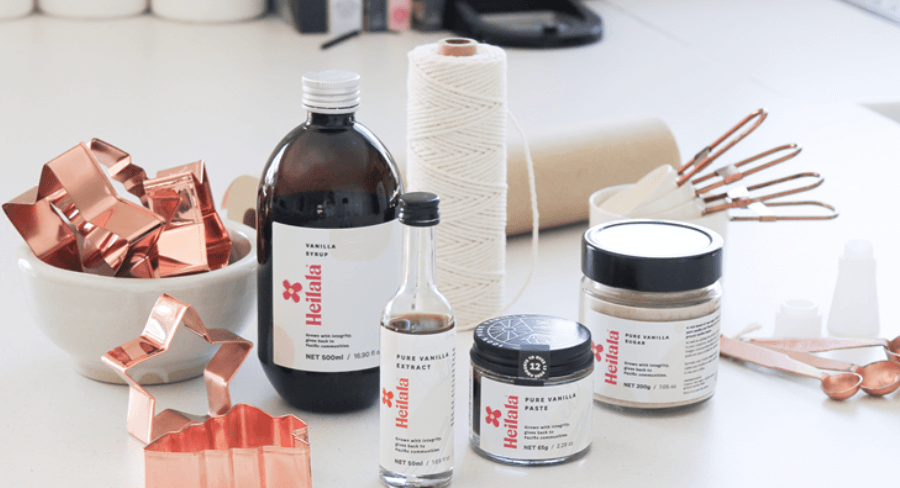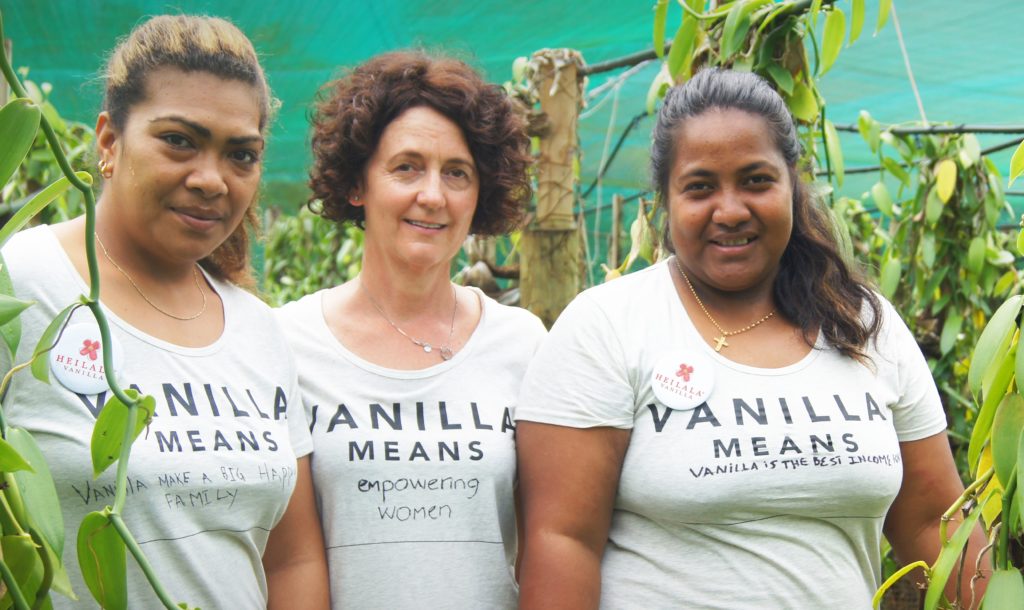Silver Linings: Heilala Vanilla
22 Apr 2021
It’s been great working with Heilala Vanilla as their BNZ Commercial Partner. Read about how their business survived and thrived in their story originally published in the Silver Linings book. This has been republished with permission from Nanogirl Labs, written by David Downs and Joe Davis.
It’s a mystery that people use the term ‘vanilla’ to mean ‘plain or boring’, when in fact the vanilla flavour is subtle, creamy, sweet and mellow. It was grown by the Aztecs, and once believed to have medicinal properties. Its long black pods are sought-after by chefs and ice-cream manufacturers globally. It’s also extremely expensive — the second most expensive spice by weight after saffron. That might be because it is a difficult crop to grow — as a sub-genus of the notoriously fickle orchid, it requires three to five years to come to maturation, and requires dedication, time and attention. It’s also one of the most labour-intensive crops in the world: the flower opens just once a year, and needs to be pollinated by hand within six hours of opening. It then needs to be cured and dried, and so it can take years for the pods to be ready to use. Now that we all know and appreciate a bit more about the wonderful spice that is vanilla, we can tell the story of Tauranga-based company Heilala Vanilla.
Named for the small iconic Tongan flower, Heilala Vanilla was founded on strong beliefs — a humanitarian mission to assist the people of Tonga after a devastating cyclone hit in 2002. New Zealander Jennifer Boggiss co-founded Heilala with her father, and they partnered up with a local family in the village of Utungake to develop a vanilla plantation, realising that the rich Pacific soil was an ideal medium in which to grow vanilla, and the strong Polynesian sun was an ideal way to naturally dry the pods, intensifying the flavour of the ‘Madagascar Bourbon’ variety they chose. It was also a great way to help the community get back on its feet. The partnership has created what they modestly call ‘the world’s most-awarded vanilla’, but perhaps more importantly, has sustainably supported around 400 vanilla-farming families in Tonga. They have a goal to have 200 women employed by 2021 and will have 150 acres of vanilla planted there soon. “Heilala is based on a true sustainable and fair-trade story: we provide a market, and they provide the best vanilla in the world,” explains Jennifer. So it’s no surprise that when Covid hit, Jennifer’s mind immediately started thinking of how to help the villagers in Tonga. “Our team in Tonga asked us to help them by sending over some hand sanitiser” — but when Jennifer and team went to buy some, they found supplies in New Zealand were depleted, and they couldn’t source any.
As had a number of others, they soon realised they had the raw ingredients to make hand sanitiser themselves, as they used ethanol for the extraction process of their vanilla essence. They quickly set up a way to manufacture the hand sanitiser they needed for their Tongan team — and then realised they could improve on the basic formula. Yep, they added vanilla to the product, giving it a much more attractive smell than the harsh hand sanitisers they’d seen elsewhere. They also didn’t like the sticky gel texture of other products, and so went to the extra effort of putting theirs into a nice spray bottle. When they’d finished, they realised they had a really good product on their hands, so decided to start marketing it. ‘Within 48 hours we’d put together the product formula, packaging, photography and branding for a new vanilla-based hand sanitiser,’ Jennifer recalls. It was a hit — not only with the team members in Tonga but also with the customers in New Zealand, who loved the idea of the spray bottle, and the pleasant scent of authentic vanilla. It opened up a whole lot of new customers for them, too, expanding their reach.

And while the chef and food-service trade was down, the explosion of home-baking during Covid was a big boon for Heilala, too; with bakers around New Zealand wanting to show off their skills, Heilala’s quality products were in strong demand. It was this increased demand from consumers, plus their successful foray into hand sanitisers, that gave Heilala another idea: if vanilla-scented products were popular, why not make more of them? It’s taken us on a journey — we are now developing products that are used in the kitchen, for cleaning, for keeping the family safe.’ This is an ‘and’, not an ‘or’ — Heilala is hiring more people in New Zealand to help with the new product range, and has started expanding their online sales channels globally. ‘We were lucky that we had already developed a really strong online presence on platforms like Amazon, and that’s been a great way to scale up.
With a rapid change initially set up to service and help their workforce in Tonga, the change to include hand-cleaning and other consumer products has been a rapid shift, in a positive direction. ‘It’s all been a bit of a blur — the business has changed quite a lot in the past four to five months.’
The Heilala flower is a mystical and special flower in the Tongan tradition — when you dip the white flower into salt water, it changes to a pinky-red colour. For Jennifer, this ability to change is a good sign. ‘The new normal is a continuous state of change.’
‘Silver Linings’ is available at all good booksellers.
Any views expressed in this article are the personal views of David Downs and Joe Davis and based on the views and experiences of the business owner. They do not necessarily represent the views of BNZ, or its related entities.
The information in this article is provided for general purposes only, and is a summary based on selective information which may not be complete for your purpose.
Images supplied by Heilala Vanilla.



